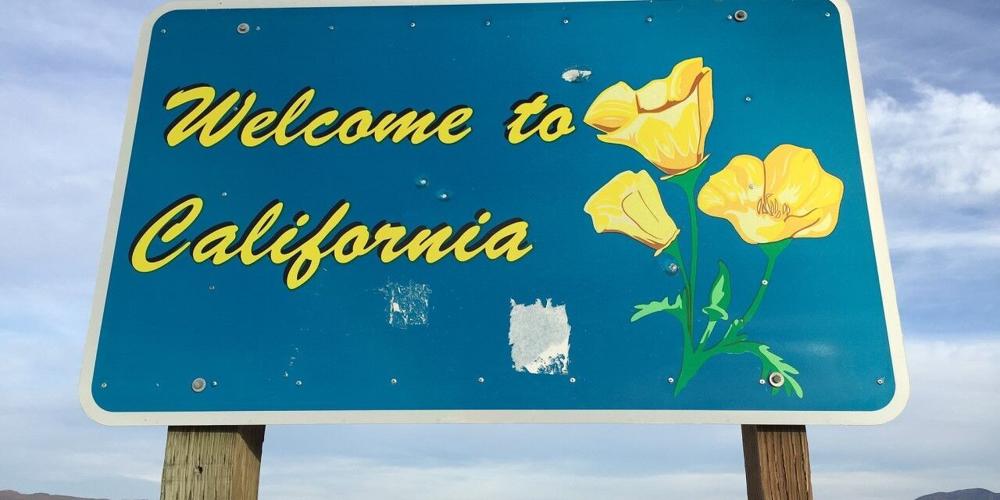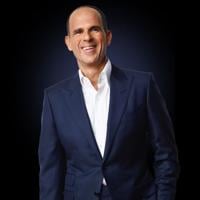
California state welcome sign
MURRAY, UTAH - In coming months, the new owners of the Bed Bath & Beyond home stores will launch an attempt to resurrect the once prominent retail brand, opening hundreds of new physical stores across the U.S.
However, the man who is leading the revitalization effort says the stores will not return to California, once the U.S. state home to the largest concentration of stores in the retail chain.
And the reason? In part, because of California's well-established reputation as one of the country's most lawsuit-friendly and anti-business court systems, according to statements from the retailer's new leader.
"We will not open or operate retail stores in California," said Marcus Lemonis, a prominent celebrity investor and businessman, who now also serves as executive chairman of Bed Bath & Beyond parent company, Beyond Inc.
"This decision isn’t about politics — it’s about reality. California has created one of the most overregulated, expensive, and risky environments for businesses in America.
"It’s a system that makes it harder to employ people, harder to keep doors open, and harder to deliver value to customers."
And legal reform advocates say the retailer's decision to avoid California in its resurrection speaks volumes about the state's current reputation and its economic outlook.
For decades, Bed Bath & Beyond built a network of home goods stores, becoming a standard in malls and strip malls across the U.S.
California, the country's largest, most populous and wealthiest state, was home to the largest number of Bed Bath & Beyond stores. In 2022, for instance, there were 87 Bed Bath & Beyond stores open in the Golden State.
Texas was next with 76 stores, followed by New Jersey (70), Florida (69), New York (60) and Illinois (31).
However, in 2023, Bed Bath & Beyond closed all of its physical stores, declaring bankruptcy amid long term operational struggles and an inability to restore customer foot traffic amid closures and other societal restrictions ordered by states and cities throughout the U.S. during the Covid pandemic in 2020 and 2021.
The company's ownership at the time then sought to continue as an online retail business.
However, now under the rubric of a company known as Brand House Collective, Bed Bath & Beyond seeks to stage a comeback, with plans to open at least 300 new stores across the U.S. According to a company press release issued July 28, Bed Bath & Beyond will largely take the place of stores formerly branded as Kirkland's Home.
The first new Bed Bath & Beyond store opened in Nashville, Tennessee, on Aug. 8.
The company has not yet announced where other Bed Bath & Beyond branded stores may open.
Bed Bath & Beyond also did not respond to questions from The Record about its plans.
However, on Aug. 20, Lemonis issued a statement appearing to shut down any speculation that Bed Bath & Beyond would be returning to its former Golden State stomping grounds.
In the statement and others made during subsequent interviews, Lemonis directly blamed an anti-business climate in the state's government and its courts.
"Higher taxes, higher fees, higher wages that many businesses simply cannot sustain, and endless regulations that strangle growth," Lemonis said in the statement. "Even when the state announses a budget surplus, it's built on the backs of ordinary citizens who are paying too much and businesses who are squeezed until they break.
"At Bed Bath & Beyond, our responsibility is to our customers and our shareholders. We will not participate in a system that undermines both."

Marcus Lemonis
In a later interview, Lemonis further specifically took aim at California's court system.
“We want to be in markets where we can actually make a profit and we can provide a very competitive and fair wage and we don’t wake up every morning wondering if we’re gonna be sued by some class action lawsuit or over-regulated by a local government," Lemonis said.
Lemonis said Bed Bath & Beyond, instead, will serve California customers exclusively online, with a strategy featuring expedited deliveries within 24-48 hours, including some same day services.
"Californians will continue to get the products they love through BedBathandBeyond.com — but without the inflated costs created by an unsustainable model," Lemonis said.
The American Tort Reform Association, for instance, has annually named California among the country's worst "Judicial Hellholes."
The state, governed by a Democratic supermajority, has earned that designation through empowering a range of lawsuits through unique state laws, such as the state's Proposition 65 and its so-called Private Attorney General Act (PAGA.)
Since the 1980s, Prop 65 has fueled a tsunami of lawsuits against retailers and manufacturers alike, in legal actions accusing them of making and selling products which contain "even the slightest, non-threatening trace of more than 1,00 chemicals that state environmental regulators deem carcinogenic or otherwise toxic," ATRA has said.
And nearly 90% of all money generated through settlements under Prop 65 lawsuits are paid as legal fees to the attorneys who file the suits, according to research cited by ATRA.
Businesses in California are also routinely targeted under the state's PAGA law, which ATRA said has come to be known as the "Sue Your Boss" law.
Under the law, workers who believe their employer has violated a provision in California's labor laws can invoke the PAGA law and step into place of the state of California to sue on behalf of all of their coworkers.
The number of PAGA lawsuits has increased by more than 273% in the past 15 years. And about three-quarters of all penalties paid by employers under PAGA legal actions go to the state of Calfornia, with plaintiffs' lawyers claiming about one-third or more of the remaining 25%, which is supposed to go to "aggrieved employees."
At the same time, California businesses have ranked consistently as the top targets for a host of other lawsuits, including those brought by "serial plaintiffs" under the Americans with Disabilities Act and California's Unruh Civil Rights Act.
The legal reform advocacy group, Protecting American Consumers Together (PACT), noted Bed Bath & Beyond stood out as a particular target for personal injury lawyers and other plaintiffs' lawyers.
In a report published Aug. 21, PACT noted the personal injury firm Downtown LA Law Group even advertises themselves online as "Bed Bath & Beyond Slip and Fall Attorneys."
Bed Bath & Beyond notably settled a slip-and-fall personal injury case in 2020 for $1.4 million.
“California’s overly litigious environment has created a system that drives away companies and limits choices for consumers,” said Lauren Zelt, Executive Director of Protecting American Consumers Together. “Bed Bath & Beyond’s decision underscores the real-world impact of lawsuit abuse. Families ultimately pay the price when companies cannot afford to operate in California.”






